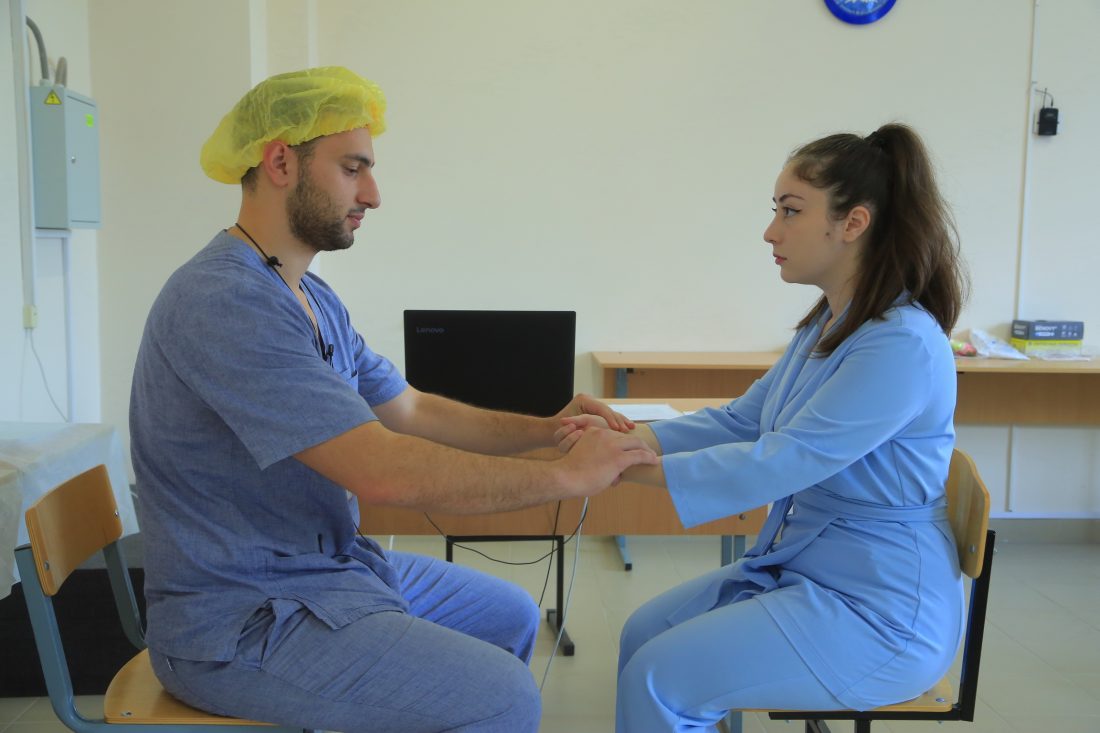The fate of future doctors is being decided: primary accreditation is underway at the KBSU Medical Academy

About 270 sixth-year students of the Medical Academy of the Kabardino-Balkarian State University named after Kh. M. Berbekov in the direction of training «Medicine» is currently undergoing one of the most important practical exams — the primary state accreditation of a specialist.
In accordance with Federal Law No. 323-FZ “On the Basics of Protecting the Health of Citizens in the Russian Federation”, persons who have received medical or other education in Russian organizations engaged in educational activities and who have passed the accreditation of a specialist have the right to carry out medical activities in the Russian Federation.
The purpose of accreditation is to determine whether the knowledge, skills and abilities of a medical graduate correspond to state requirements for the implementation of medical activities. This procedure is carried out by a special accreditation commission in accordance with high technological standards in the field of medical education after the completion of the main training program and at least once every five years.
The primary accreditation program has been in existence since 2016. It is the same for all medical universities in the country. This procedure makes it possible to check not only the theoretical knowledge of students after the end of the 6th year, but also to assess their practical skills in providing medical care in the most difficult situations, when the doctor is one on one with the patient,
— explained the head of the accreditation and simulation center of the medical academy of the KBSU Eldar Sultanov.
The accreditation procedure itself is a series of successive tests, where the passing of each stage is a guarantee for passing the next one. In other words, it is impossible to change the sequence of exams or get admission to the next if you “fail” the previous one.
The Order of the Ministry of Health of the Russian Federation dated June 2, 2016 No. 334-N “On Approval of the Regulations on the Accreditation of Specialists” states that primary and primary specialized accreditation include the following stages:
— testing. Students complete 80 tests, you need to correctly complete at least 70 percent of the task. Those who perform correctly over 70% of the tests are allowed to the second stage, and if for some reason the student could not pass the test the first time, he has 2 more attempts. Three attempts for each stage;
– assessment of practical skills (skills) in simulated conditions. Each station has its own checklist, which clearly spells out the algorithm of actions of the accredited person. All of these items accredited must demonstrate. To pass primary accreditation, you need to go through five stations. The first is an intravenous injection, the second is the collection of complaints and anamnesis, the third is a physical examination of the respiratory, cardiovascular system or gastrointestinal tract, the fourth is cardiopulmonary resuscitation, the fifth is the provision of emergency care in ten scenarios — the most dangerous scenarios, with which trainees should be able to independently provide assistance to the victim. Each station is given 10 minutes, in order for the second stage to be counted as passed, you need to score at least 70% of the total points. If at any of the stations the accredited person did not get the required number of points, he goes to the second attempt;
— solution of situational problems, carried out in a test computer room.
All three stages of accreditation are carried out under video control, recording is carried out by several cameras, and upon completion of accreditation, video materials for all three stages are provided at the request of the federal accreditation center. A similar practice of assessing the skills and basic basic skills of a doctor, the ability to provide medical care in extreme situations is also available abroad,
— said Eldar Sultanov.
A person is considered to have passed the accreditation of a specialist from the moment the data on the accreditation of a specialist by a person is entered into the unified state information system in the field of health care, with the exception of certain categories of persons in respect of which the Government of the Russian Federation establishes the specifics of conducting accreditation of a specialist and recognizing him as having passed accreditation.
Data on a person’s passing the accreditation of a specialist is entered into the unified state information system in the field of health care as part of maintaining personalized records of persons involved in the implementation of medical activities, in accordance with Articles 92 and 93 of Federal Law № 323-FZ.
At the request of a person who has passed the accreditation of a specialist, he is issued a certificate of accreditation of a specialist on paper and (or) an extract of accreditation. A certificate of accreditation of a specialist and an extract of accreditation have the same legal force when confirming the fact that a person has passed the accreditation of a specialist.
From January 01, 2023, the accreditation of specialists in the Russian Federation is regulated by the Regulations on the accreditation of specialists, approved by order of the Ministry of Health of Russia dated October 28, 2022 № 709n.
On July 28, the graduates of the Medical Academy of KBSU are waiting for the third stage of accreditation, after which the cherished results will appear in the database of the accreditation commission and in the personal accounts of graduates on the public services portal.
In case of successful completion of accreditation, medical graduates will receive the right to carry out medical activities and choose the direction of further training in residency in a narrow specialization. There are 34 such areas in the Medical Academy of KBSU.
We wish our future doctors success in accreditation!

